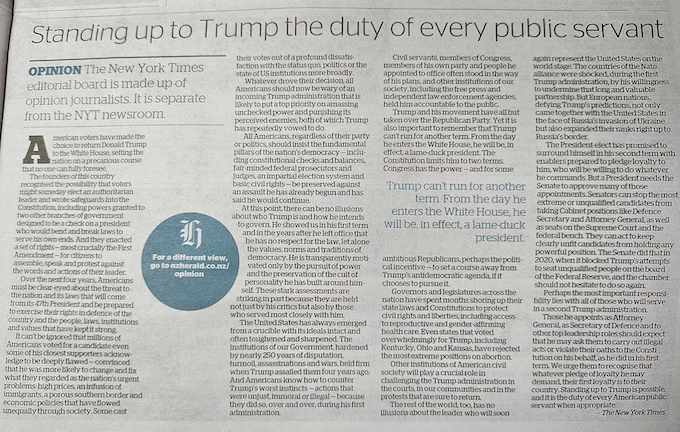 TRUMP VOTER IN New Hampshire
TRUMP VOTER IN New Hampshire
Cambridge, UK — As the voting results started coming in here from Virginia at 4 am (GMT, which is five hours later than Eastern Time in the US), I went to bed, having seen enough to know that Kamala Harris’s crash campaign for the White House was failing.
I knew what was coming. I’d experienced it four times already. In 1968 I watched Richard Nixon, the notorious House version of Commie-hunter Sen. Joe McCarthy rouse what he dubbed the “Silent Majority” of right-wing white bigots and pro-Vietnam War super-patriots and defeated Hubert Humphrey (an earlier VP who the Democratic party chose as their nominee when their incumbent president after, Lyndon Johnson decided not to seek re-election).
There was a sense of hopelessness on the left the morning after Nixon’a election.
It happened again in 1980, with the surprise win by Republican Ronald Reagan, who defeated incumbent Jimmy Carter. That morning, I got up early and went down to Broadway from my 11th-floor apartment on Manhattan’s Upper West Side. Walking down the largely empty sidewalk like a zombie, I passed a few people headed the other way, their faces looking similarly shell-shell shocked, until a neighborhood friend, John Hess, a spritely, gray-bearded retiree N.Y. Times staffer, bounded up to me cheerfully. “Isn’t it great?” He said with a smile. “The Republicans also took the Senate!”
“What’s so great about that?” I asked, astonished that this radical leftist journalist would say such a thing.
“Because,” he explained, “If the Democrats control Congress, Reagan can’t blame all his disasters on them. Now he won’t have the ability to blame anyone but himself!”
Actually, in the event, Reagan managed to serve out two terms, and even accomplished some positive things including negotiating with House Majority Leader Democrat Tip O’Neill a rescue of the underfunded Social Security program and ending the Cold War and (at least temporarily) the nuclear arms race with the Soviet Union.
Then, of course, there was the Supreme Court which in 2000 stole the election for George W Bush by halting the vote counting in Florida, where it was clear that Democratic Vice President Al Gore, who had already won the popular vote, would also have won the state and its Electoral College total. Instead, the feckless top court gave the White House to Bush and Dick Cheney.
And finally there was the night Donald Trump stunned the pundits and himself by winning the White House and defeating Democrat Hillary Clinton in 2016.
So waking up Wednesday morning to see that Trump would be president for another nightmare four-term had for me a definite “Groundhog Da” feel to it — but without the guy-gets-girl happy ending to it).
Actually, this time Trump 2.0 is worse than those four earlier Republican wins. This time the Republican president will have solid control of both houses of Congress, with a Senate so overwhelmingly Republican that it will be able to pass almost any piece of legislation without Democrats blocking it, and will likely remain in Republican hands for Trump’s full term. This time around, the Supreme Court too is solidly controlled 6-3 by hard-right justices, and Trump has made it clear that every cabinet office and every government agency will be run by “loyal’ lackeys of his choosing, with even civil service employees either replaced or cowed into submission — including at such normally independent agencies as the Pentagon, CIA, Justice Department and EPA. Even the late irrepressible John Hess would have had a hard time finding a bright side to this Election Day outcome.
Nonetheless I’m going to give it a try.
First a reality check: What we see in the 2024 election result is that a majority of Americans — men and women, rich and poor, white and people of color, educated and uneducated, religious and atheist — are either ready to gamble on a self-involved sociopathic, racist and misogynist criminal billionaire with anger issues or are too concerned with just getting by with their daily lives to to worry about elections that never seem to change their lives for the better or that even make them harder. Analysis of the voting shows that a huge percentage of late voting younger people went for Trump. And a tidal wave of women voting for Harris didn’t materialize. More women voted than men, as usual, but plenty of them went for the pussy-grabbing rapist Trump. Trump also did better with Black men than he did in 2016 and 2024 and significantly improved his tally among Latinos (or as he calls them “Hispanics”). In the end Harris’s larger share of women voters was the same as Trump’s larger share of men, making the predicted gender war a wash-out.
Here in the UK, where I am living for the next nine months, I can see what the results of such so-called populist voting trends can be. British voters in 1979 elected a hard-right Prime Minister named Margaret Thatcher and allowed her and her Conservative Party to set off a seismic shift of the country’s politics away from social democracy and a rather classical conservatism into a two-party Neo-liberal dystopia where both parties accepted the notion that capitalism, unfettered markets, and a coddled business elite managing things was the best option for society.
This narrowed political playing field has led over the ensuing decades to a long period British economic doldrums, and to a turning away by Brits from the rest of Europe, as resentment and hostility towards outsiders, including eastern Europeans, and especially people from Africa, Asia and the Caribbean — all of them willing to work for less and to leave countries that had it even worse — availed themselves of the lack of borders across Europe to flock to the UK. This latter phenomenon led to the narrow victory of a referendum that resulted inBritain’s removing itself from the European Union. Called Brexit, this abrupt anti-immigrant “secession” has wreaked havoc on the nation’s economy and living standards, as well as the operation of key services like the country’s once vaunted National Health System.
Just this past July, British voters, frustrated with a country and government where “nothing works anymore,” turned out the Conservatives after 15 straight years of Tory rule and handed a landslide win to the Labour Party and its new Prime Minister Keir Starmer. How that new government will fare in its effort to right the ship of state and its stagnating economy, given the incredible decades-long disinvestment and privatization it is hoping to reverse, remains to be seen.
I suspect the US, under a second Trump administration, this time emboldened by a political realignment at least as profound as was Thatcher’s 1979 win in the UK, will soon be similarly strip-mined and privatized.
The one bright spot, however, if President-re-elect Trump, a shameless liar, can be taken at his word, would be if he actually were to brings an end to the decade of US military aid political brinksmanship in pushing Ukraine to break away from neighboring Russia’s sphere of influence and to join NATO, the US-led anti-Russian alliance created way back at the start of the Cold War of he 1950s. Trump says, quite logically, that US efforts to pull Ukraine into NATO, a mutual protection pact whose very existence is an existential threat to Russia, and the Ukraine government’s now ten-year old armed conflict with first its ethic Russian minority and then, when Russia responded by invading Ukraine, with Russia, a leading nuclear power, has led to a war in which Ukraine’s military is largely underwritten by US arms and financial banking interests. It is a war that the US knows poses a high risk of provoking a devastating and potentially world-ending nuclear conflict between ther world’s two nuclear superpowers.
During the just concluded election campaign, Trump promised to bring an end to that bloody military conflict immediately before even waiting for his second inauguration in January. He has also promised to end the one-sided slaughter of Palestinians in Gaza, though without specifying how.
I am no fan of Trump, but I have to say should he successfully cut short those two bloody conflicts, or even ends the Ukraine war while at least not making things worse in Gaza, his new presidency would be off to a great start. He should follow that up by returning the US to the treaty relationship on nuclear weapons that his Republican predecessor Ronald Reagan worked out with former Soviet and Russia leader Mikhail Gorbachev, which effectively, if all too briefly, ended the two countries’ nuclear standoff and raised humanity’s hopes for an end to nuclear weapons altogether. Trump should also follow through with his prior effort to pull the US out of NATO, which long ago morphed into a cover for and participant in US global military actions around the world and simply serves as an excuse for ploughing over a trillion dollars a year into the coffers of the US arms industry.
Martin Luther King, a year to the day before the day in 1968 that he was assassinated (my birthday) he gave a speech at the Riverside Church in New York titled Beyond Vietnam:A Time to End the Silence.” In it he correctly identified the US, at that time conducting a bloody aggressive war in Indochina, as being “the greatest purveyor of violence in the world.” It has remained so, Indeed its endless wars and “interventions,” have reportedly killed well over 6 million people, mostly civilians, around the world in the eight decades since WWII.
Trump knows this and has talked of pulling US forces back from the hundreds of places they are based in foreign lands (though that idea was at one point linked by him to the idea of using them against American dissidents here at home — NOT a Great idea!).
He should pull them back and decommission them.
Trump has said on a number of occasions that he does not want wars — that as a businessman, he wants the US to do business with other nations, on a level playing field. That is a great sentiment, and it’s one that his base, those MAGA voters, some of whom I know and have had conversations with,. Trump should be held to that promise, and should downsize the US military to a size appropriate to a country that is not facing any threat of invasion and that stops meddling militarily in other countries and maintaining bases around the globe. That is a position a lot of Trump’s MAGA backers agree with.
For now though, all we have from President-elect Trump are promises like “I’m not going to start wars, I’m going to stop wars,” and unless acted upon these cannot be taken seriously. But that said, I have to say the words themselves are welcome, and it’w a promise that I’ve never heard the likes of coming from any other president-elect of either party.. (Okay, Richard Nixon claimed during his first presidential race that he had a “secret plan’ for ending the war in Vietnam, but that “plan” turned out to be to massively carpet-bomb North Vietnam using B-52s. expand the war into Laos and Cambodia and to ship more US combat troops into the country. Once elected, he kept the war going until he resigned from office in disgrace.)
We on the left are facing an existential crisis with Trump’s election victory but also an opportunity
Supporting the Democrats and their chosen candidate Kamala Harris as a tactical move to preserve freedom to organize and to protest was clearly unsuccessful as her poorly performed campaign did worse than Hillary Clinton did against Trump eight years before. Indeed, she lost not just in the Electoral College tally but in the popular vote, which Clinton at least won. The Democratic Party has been shown once again to be a pathetic joke as a political opponent. Sen. Bernie Sanders, who won a resounding re-election to the Senate in Vermont, identified right before Harris’s concession speech on Thursday, the party’s problem: It is owned by billionaires and moneyed consultants wedded to corporate interests, and is dismissive or even hostile to the interests of the working class.
But the pathetic showing of third party candidates in this, as in prior elections, has shown that building a third party is also a fool’s errand in a country where the political system is structured to prevent them.
That leaves us with the option of building a large movement outside of political parties focussed around broad popular issues that would bring working-class people together common goals like peace and demilitarization, significantly raising the minimum wage, improving and protecting Social Security, making Medicare universal for all ages, passing the Equal Rights Amendment and protecting every women’s right to control her own body and health and seriously addressing the climate crisis.
Trump has made it clear that he wants unrestrained power, without the hindrances of a Constitution or a Congress composed of members who might think for themselves and perform their intended constitutional role as a check and balance on the Executive Branch. Trump’s history of lying, criminality, racism and misogyny and his willingness to appeal to American citizens’ basest instincts are well known. But we are stuck with him. He cannot be defeated in the courts because he has a bunch of sycophants packing the Supreme Court and in the lower level federal courts. Impeachment cannot happen and is a waste of time and effort. The weakened Congressional Democrats can no longer even put on a impeachment committee hearing this time.
With a mass movement we can pressure Trump and his Congressional supporters to do what they promised. If they go back on those promises, we can work to peel away those people who just voted for him as a “change disrupter,” especially as they begin to discover he really doesn’t give a damn about them.
Meanwhile we need to do the hard work of organize]ing wide support for resisting Trump’s worst ideas — the ones that will harm the defenseless and that will grievously contribute to climate change. For example, we need to support a campaign to protect undocumented people living in the USA from brutal arrest, detention and forced deportation, especially in cases that break up families. We clearly need to build a mass movement to protect programs like Social Security, Medicaid and Medicare. A key here is that most of Trump’s own voting base depend on those programs and on the Affordable Care Act. Trump and his advisers know this. This is why Trump vowed during his campaign not to cut them. He needs to be held to that promise. And we need to call out every Trump effort to worsen climate change by the reversal of what climate saving measures have been introduced, and by trying to sack or silence those civil service employees responsible for measuring or ameliorating climate change.
Trump, by making this false promises he won’t keep in order to win the election has handed us what we need to organize this same people.
The post
If Trump Can Be Believed, His Return to the White House Could be a Good Thing…at least Internationally first appeared on
Dissident Voice.
This post was originally published on Dissident Voice.






